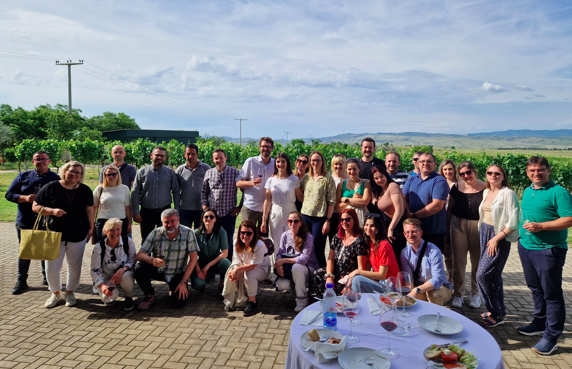
Dr. Branka Mozetič Vodopivec,
Dean of School for viticulture and enology, senior researcher of Wine Reserch Centre, University of Nova Gorica
As a member of a ruraly located university in Slovenia for more than two decades, which have been also first two decades of its life, I know how to build a research group from scratch and what it takes to be successful and keep young, highly qualified and motivated researchers in the business. First and foremost, you need a strong vision of the institution where your research group is located, as well as a long- and short-term strategy for how to build and retain it, as well as grow it. In this process, building new alliances with complementary and similar institutions is essential. With such alliances you can attract the money to create a good working environment and good conditions for new research results and very good researchers. Of course this is in short, we all know that the way is not all the time straigt up-wards. It takes also lots of optimism, hard work, a bit of luck and positive altitute of people involved. Support from institution in understanding of seasonally oriented reseaerch work that need more time to start producting good scientific results, used nowadays for validation of research group and individual, is essential as well.
The grapevine has managed to survive for thousands of years, as has winemaking, which is an important part of human civilization, and which has been improved and modernised slowly over the centuries – mainly because it was needed. The same is true for other fermented and alcoholic beverages. In the last century, the field of fermented beverage experienced a great surge of development, thanks to engineers and scientists, but also enthusiastic producers who wanted to improve their production and work hand in hand with nature to earn a decent living.
Now, at the beginning of the third decade of the new century, it is clear that the great agricultural and industrial progress of the last 100 years has had serious repercussions on our planet and our quality of life, which will manifest themselves in terrible ways in the coming decades, and humanity will face threats, hitherto occasional, that are becoming more frequent. We must look to our tradition, which can help us adapt in agriculture and food production, become more humble and stop using land for big profits without limits.
We have many good higher education (HE) institutions, we know the obstacles in the production of new knowledge, graduates for the future. We are also aware of the strengths and weaknesses of the large and small universities. They all should be included in new bigger alliances that can carry and support the important transfer of knowledge that originates in the institutions and does not reach the user, as it should.
Of course, we cannot save the planet with our project, but we believe that we are a good example of how different cross-regional institutions can work together, gain new knowledge and build new knowledge transfer facilities. In this way, we can contribute to a new generation of European university alliances, not only with our infrastructure, but also with our knowledge and skills in knowledge transfer and how to lead and be an efficient member in large cross-regional collaborative partnerships.
The idea(s) behind the Uncorking rural herritage project grew in each partner country and mind long before the project idea was submitted. When we read the EEA and Norway Grants Fund for Regional Cooperation Programme, we could clearly see ourselves in it, and we put all our efforts into action. We could not be happier and thrilled with expectations when the Fund recognised the potential of our research project. The project has greatly enhanced the international visibility of our institution and research group by allowing us to establish an analytical platform for flavour analysis that can be used in so many different projects and is already being incorporated into the training of new BSc, MSc and PhD students, even outside the existing project. We were able to invest into human capital, knowledge, which will return back in so many positive ways. We could do research in topics, important for rural developement of partner countries, give more knowledeg and skills to people about sensory evaluation of fermented beverages, upgrade existing training and research facilities that can in turn be used also for new research results and and become part of future HE institutional alliances for training experts for the future. The project is also a great example of how, with the help of science, a real and commercially well-established winery can carry out a more profound connection of the vine with its terroir specialities in the context of market and climate changes. A lot of excellent opportunities for the whole project family, which could not happen without the great suport of the EEA and Norway Grants Fund for Regional Cooperation.

